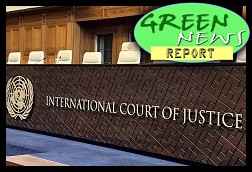 As I wrote here in 2010...
As I wrote here in 2010...
The point came to mind with a question posed during a recent
Paraphrasing a remark said to be made by an unnamed Biden Administration official, KTLA 5 moderator Frank Buckley asked primary candidate Rep. Barbara Lee (D-CA) whether she agreed that "peace [in Gaza] can only begin with the elimination of Hamas"?
After condemning the October 7th Hamas terrorist attack, Lee proclaimed that "a diplomatic and political settlement" that eventually included a "two-state solution" offers the only means for achieving peace and security. "Killing twenty-five to thirty thousand civilians is counterproductive to Israel's security." That's why, Lee explained, she was calling for a "permanent ceasefire"...
Irony
It is especially ironic that Buckley directed a question to Barbara Lee, of all people, grounded upon the same fallacious assumptions that triggered our perpetual global "war on terror" after 9/11. She was the only member of Congress, in either chamber, who displayed the wisdom and courage to vote against the 9/14/2001 Congressional Authorization to Use Military Force (AUMF) in response to the attacks.
The 2001 AUMF gave rise to a more than two-decades long military campaign, conducted at a cost of over $8 trillion. The U.S. global "war on terror" directly killed over 432,000 civilians; indirectly caused between 3.6 and 3.8 million deaths for those living in war zones, and resulted in the displacement of 38 million people. That post-9/11 strategy did not so much as contemplate, let alone attempt, the application of so-called "soft power", the use of international law and peaceful negotiation as a means to address the scourge of terrorism.
Sadly, the cost and casualties from our global "war on terror" will likely continue to grow. Last year, the U.S. Senate, via an 86 - 9 margin, rejected an amendment, offered by Sen. Rand Paul (R-KY), that would have added a repeal of the 2001 AUMF to a measure repealing the subsequent 2002 AUMF that served to authorize the Iraq War.
The problem entails more than the continuing threat of both domestic and international terrorism. As Biden acknowledged last year, quoting James Madison in an Address to the National Defense University: "No nation could preserve its freedom in the midst of continual warfare."
Ill-timed
Buckley's debate question could not have been more ill-timed.
Over the past 5 months, the Israeli military has reduced most of Northern Gaza into an uninhabitable wasteland. Approximately 80% of the Palestinian population (1.9 million) has been internally displaced and pushed to the brink of famine. Yet, more than 28,000 civilian deaths, mostly women and children, and mass displacement have failed to achieve the unconditional release of all hostages held by Hamas in Gaza --- an unconditional release that had been called for in three unsuccessful UN Security Council Ceasefire Resolutions.
Moreover, according to The New York Times, "U.S. intelligence officials told members of Congress...that Israel...was not close to eliminating [Hamas]" despite the unbridled carnage.
Better questions?
Given the carnage wrought by Israel's ongoing war on Gaza, a far more poignant debate question might have been whether the military objective of "eliminating Hamas" can even be achieved without an accompanying genocide?
Ending the presence of Hamas in Gaza may be a laudable goal, but at what price? Both Israelis and Palestinians would be better served if, for example, UN-brokered negotiations led to the replacement of Hamas control of Gaza by the far more responsible Palestinian Authority. But, of course, Netanyahu has opposed UN Security Council resolutions after years of both propping up Hamas in Gaza, while holding the Palestinian Authority down.
In light of recent polling reflecting that "only 15% of Israelis want Netanyahu to remain in power after the war in Gaza ends", perhaps a better question for the U.S. Senate candidates in California would have been whether peace in Gaza can only begin once Netanyahu is removed as Israel's Prime Minister?
 Ernest A. Canning is a retired attorney, author, and Vietnam Veteran (4th Infantry, Central Highlands 1968). He previously served as a Senior Advisor to Veterans For Bernie. Canning has been a member of the California state bar since 1977. In addition to a juris doctor, he has received both undergraduate and graduate degrees in political science. Follow him on twitter: @cann4ing
Ernest A. Canning is a retired attorney, author, and Vietnam Veteran (4th Infantry, Central Highlands 1968). He previously served as a Senior Advisor to Veterans For Bernie. Canning has been a member of the California state bar since 1977. In addition to a juris doctor, he has received both undergraduate and graduate degrees in political science. Follow him on twitter: @cann4ing


 A Pu Pu Platter of Trump Corruption: 'BradCast' 7/29/25
A Pu Pu Platter of Trump Corruption: 'BradCast' 7/29/25  'Green News Report' 7/29/25
'Green News Report' 7/29/25
 GOP Cuts to Medicaid, Medicare, ACA Could Trigger 'Catastrophic' Crisis This Fall: 'BradCast' 7/28/25
GOP Cuts to Medicaid, Medicare, ACA Could Trigger 'Catastrophic' Crisis This Fall: 'BradCast' 7/28/25 Sunday 'Pedo Files' Toons
Sunday 'Pedo Files' Toons Landmark Climate Ruling at World Court; More Epstein Trouble for Petty Little Tyrant: 'BradCast' 7/24/25
Landmark Climate Ruling at World Court; More Epstein Trouble for Petty Little Tyrant: 'BradCast' 7/24/25 'Green News Report' 7/24/25
'Green News Report' 7/24/25 Trump's Epstein 'Conspiracy Machine Not Going Away': 'BradCast' 7/23/25
Trump's Epstein 'Conspiracy Machine Not Going Away': 'BradCast' 7/23/25 Dems Unlikely to Counter GOP's TX Redistricting Scheme: 'BradCast' 7/22/25
Dems Unlikely to Counter GOP's TX Redistricting Scheme: 'BradCast' 7/22/25 'Green News Report' 7/22/25
'Green News Report' 7/22/25 Not a Drill!: Trump Gutting News Media, Press Freedoms: 'BradCast' 7/21/25
Not a Drill!: Trump Gutting News Media, Press Freedoms: 'BradCast' 7/21/25 Sunday 'Wonderful Secret' Toons
Sunday 'Wonderful Secret' Toons 'Green News Report' 7/17/25
'Green News Report' 7/17/25 CO Election Clerks Block Vote System Breach: 'BradCast' 7/17/25
CO Election Clerks Block Vote System Breach: 'BradCast' 7/17/25 'Superman is Story of America'. No Wonder MAGA Hates Him: 'BradCast' 7/16/25
'Superman is Story of America'. No Wonder MAGA Hates Him: 'BradCast' 7/16/25  Trump IRS: Churches May Endorse. (Are All Nonprofits Next?): 'BradCast' 7/15/25
Trump IRS: Churches May Endorse. (Are All Nonprofits Next?): 'BradCast' 7/15/25 Support for Immigrants Skyrockets Amid Trump's Crackdown: 'BradCast' 7/14/25
Support for Immigrants Skyrockets Amid Trump's Crackdown: 'BradCast' 7/14/25  Democracy STILL Our Best Way Out of This -- And Repubs Know It: 'BradCast' 7/10/25
Democracy STILL Our Best Way Out of This -- And Repubs Know It: 'BradCast' 7/10/25 'Mass Shooter Subsidy'?: More Dumb, Deadly Stuff in Trump's New Law: 'BradCast' 7/9/25
'Mass Shooter Subsidy'?: More Dumb, Deadly Stuff in Trump's New Law: 'BradCast' 7/9/25  Trump's New Law Supersizes ICE, Mass Detention: 'BradCast' 7/8/25
Trump's New Law Supersizes ICE, Mass Detention: 'BradCast' 7/8/25 Texas Flooding Tragedy Was Both Predictable and Predicted: 'BradCast' 7/7/25
Texas Flooding Tragedy Was Both Predictable and Predicted: 'BradCast' 7/7/25
 VA GOP VOTER REG FRAUDSTER OFF HOOK
VA GOP VOTER REG FRAUDSTER OFF HOOK Criminal GOP Voter Registration Fraud Probe Expanding in VA
Criminal GOP Voter Registration Fraud Probe Expanding in VA DOJ PROBE SOUGHT AFTER VA ARREST
DOJ PROBE SOUGHT AFTER VA ARREST Arrest in VA: GOP Voter Reg Scandal Widens
Arrest in VA: GOP Voter Reg Scandal Widens ALL TOGETHER: ROVE, SPROUL, KOCHS, RNC
ALL TOGETHER: ROVE, SPROUL, KOCHS, RNC LATimes: RNC's 'Fired' Sproul Working for Repubs in 'as Many as 30 States'
LATimes: RNC's 'Fired' Sproul Working for Repubs in 'as Many as 30 States' 'Fired' Sproul Group 'Cloned', Still Working for Republicans in At Least 10 States
'Fired' Sproul Group 'Cloned', Still Working for Republicans in At Least 10 States FINALLY: FOX ON GOP REG FRAUD SCANDAL
FINALLY: FOX ON GOP REG FRAUD SCANDAL COLORADO FOLLOWS FLORIDA WITH GOP CRIMINAL INVESTIGATION
COLORADO FOLLOWS FLORIDA WITH GOP CRIMINAL INVESTIGATION CRIMINAL PROBE LAUNCHED INTO GOP VOTER REGISTRATION FRAUD SCANDAL IN FL
CRIMINAL PROBE LAUNCHED INTO GOP VOTER REGISTRATION FRAUD SCANDAL IN FL Brad Breaks PA Photo ID & GOP Registration Fraud Scandal News on Hartmann TV
Brad Breaks PA Photo ID & GOP Registration Fraud Scandal News on Hartmann TV  CAUGHT ON TAPE: COORDINATED NATIONWIDE GOP VOTER REG SCAM
CAUGHT ON TAPE: COORDINATED NATIONWIDE GOP VOTER REG SCAM CRIMINAL ELECTION FRAUD COMPLAINT FILED AGAINST GOP 'FRAUD' FIRM
CRIMINAL ELECTION FRAUD COMPLAINT FILED AGAINST GOP 'FRAUD' FIRM RICK SCOTT GETS ROLLED IN GOP REGISTRATION FRAUD SCANDAL
RICK SCOTT GETS ROLLED IN GOP REGISTRATION FRAUD SCANDAL VIDEO: Brad Breaks GOP Reg Fraud Scandal on Hartmann TV
VIDEO: Brad Breaks GOP Reg Fraud Scandal on Hartmann TV RNC FIRES NATIONAL VOTER REGISTRATION FIRM FOR FRAUD
RNC FIRES NATIONAL VOTER REGISTRATION FIRM FOR FRAUD EXCLUSIVE: Intvw w/ FL Official Who First Discovered GOP Reg Fraud
EXCLUSIVE: Intvw w/ FL Official Who First Discovered GOP Reg Fraud GOP REGISTRATION FRAUD FOUND IN FL
GOP REGISTRATION FRAUD FOUND IN FL

































